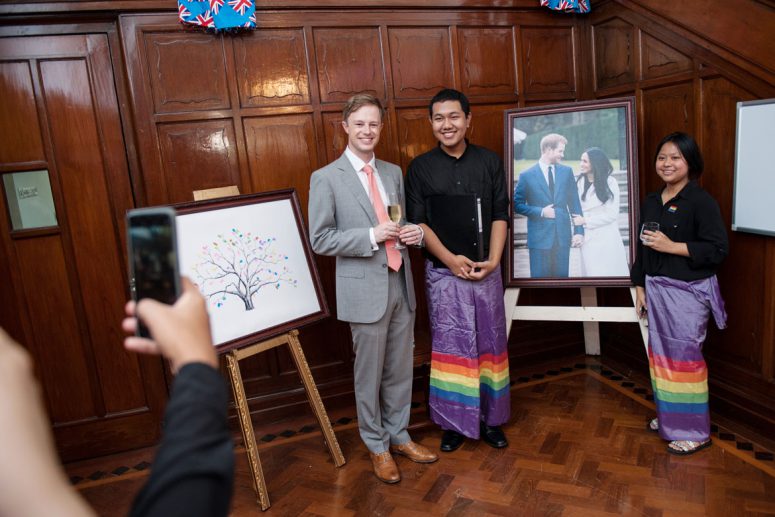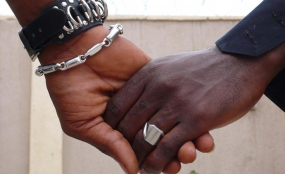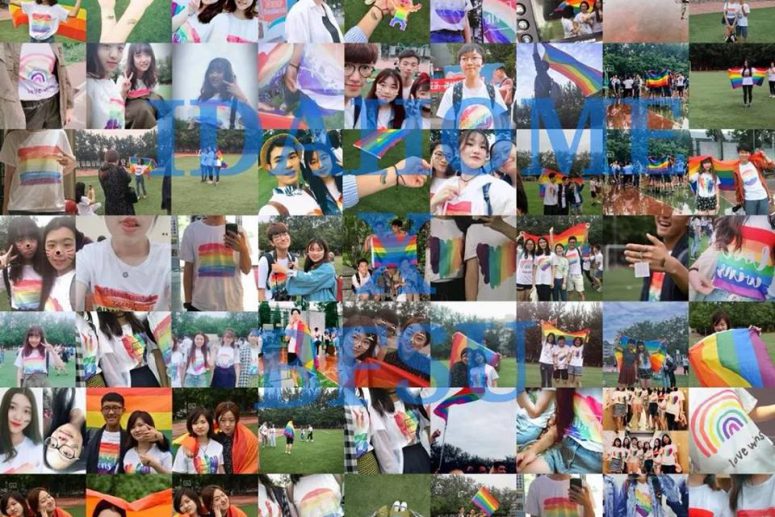
Still, here were no crowd-lined boulevards in Yangon. As Ms Markle was walked up the aisle by the father of the groom, Prince Charles, it was about 6pm local time and still scorching.
But, thousands did tune in to the live stream of the event on Facebook, where user reactions ranged from adoration to utter bemusement.
An overriding theme of the day was that love transcends cultural boundaries. “The royals are a proud family. It’s really heart-warming and I can feel the love,” one user commented on the DVB Facebook page.
 The &PROUD LGBT Choir sing during the reception for the royal wedding at the British Ambassador’s residence in Yangon. Aung Khant/The Myanmar Times
The &PROUD LGBT Choir sing during the reception for the royal wedding at the British Ambassador’s residence in Yangon. Aung Khant/The Myanmar Times
Comparisons were also made with the ‘Myanmar elites’. “Wow look at that, she looks totally different to [Thandar Shwe],” wrote a user underneath the live stream of the wedding on the Duwun Facebook page.
Thandar Shwe, the eldest daughter of former General Than Shwe, wore a bright pink gown and millions of dollars of diamonds in her hair at her infamously opulent wedding in 2006. Ms Markle’s simple tiara and elegant bridal whites paled in comparison. Some estimates put the value of the gifts given to Thandar Shwe and her husband Major Zaw Phyo Win at US$50 million.
Still, even though there wasn’t a champagne tower to be seen (or slurped), the occasion wasn’t cheap either. British taxpayers did foot an estimated bill of $43 million for wedding security while private expenses were paid for by the Royal Family through treasury grants. Prince Harry and Meghan asked guests to donate to seven charities of their choice.
The cultural clash did not stop there. Making a reference to Ms Markle’s very discreet make-up, one user said : “If a Burmese make-up artist had put that on a Burmese bride, there would be a problem.”
 Commemorative flags are seen during the reception for the royal wedding at the British Ambassador’s residence in Yangon. Aung Khant/The Myanmar Times
Commemorative flags are seen during the reception for the royal wedding at the British Ambassador’s residence in Yangon. Aung Khant/The Myanmar Times
Some enjoyed the occasion but were more circumspect: “I’m glad we don’t have a monarchy, if we had royal weddings like this, there would too many problems among the royal family and so much controversy,” one user wrote under the Facebook hashtag #RoyalWedding.
Blue-blooded Burmese do exist, but have no role in state ceremony. (That does not mean that dynastic lineage does not play a role in the exercise of power in Myanmar)
Others weren’t swept up in the wedding fever: “They did not do anything for their country but it cost the [British] public a lot of money for their wedding. I don’t like this monarchy system. I don’t understand it,” read one comment on the 7Day News Journal Facebook page.
Cupcakes and sandwiches
A small reception was held the following day at the British Ambassador’s residence in Yangon, where Deputy Ambassador David Hall toasted the newlyweds calling the occasion a celebration of love.
“Quite a lot of people got that sense that love is universal and that their wedding wasn’t so different from everyone else’s weddings,” Deputy Ambassador Hall told Pulse.
In the colonial-era mansion’s lofty drawing room, guests munched on elderflower cupcakes and tuna sandwiches. Many of the guests were representatives from charities and NGOs focusing on causes dear to the newlyweds.
The event finished with a performance from the &PROUD LGBT Choir to mark the International Day Against Homophobia, Transphobia & Biphobia on May 17.
 Britain’s Deputy Ambassador David Hall poses for a photo with members of the &PROUD LGBT Choir at the British Ambassador’s residence in Yangon. Aung Khant/The Myanmar Times
Britain’s Deputy Ambassador David Hall poses for a photo with members of the &PROUD LGBT Choir at the British Ambassador’s residence in Yangon. Aung Khant/The Myanmar Times
“For everyone, getting married is about overcoming some sort of obstacle along the way… We have things like ‘do our parents approve? Is it acceptable to marry across class, ethnicity, and racial and religious divides?’ That can be a challenge in any country, and definitely in Myanmar,” said Hall.
“[The Royal Wedding] is one those things that doesn’t seem controversial. People see this as something that’s not political and it’s been wonderful to have this party and all celebrate love together.”
Now that she has married a foreigner, Ms Markle has become the Duchess of Sussex. Unlike in Myanmar, the title already existed and did not need to be created to circumvent constitutional constraints. – Additional reporting by Ei Shwe Phyu.



